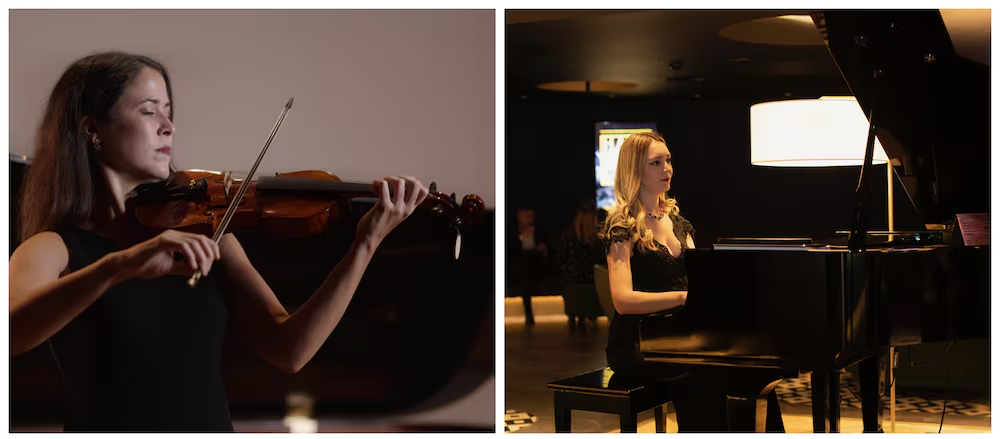by Gemma White (originally posted @ THE NATIONAL)
Picking up an instrument later in life could improve mental health and keep depression at bay
As an adult, it’s easy to come up with plenty of excuses to stop learning. There’s work and family plans, not to mention trying to fit in the gym, seeing friends, chores, side hustles, hobbies and more.
The idea of adding in another commitment may seem ludicrous. But when it comes to learning a musical instrument as a grown-up, the pros far outweigh the cons thanks to the many mental, physical and emotional benefits that come with it.
“Learning an instrument in any decade of your life is beneficial for the brain and in the prevention against dementia,” says Dr Manio Maravic, neurologist at German Neuroscience Center in Dubai. “Lifelong engagement in music is associated with better brain health among people over the age of 40.”
A study by the UK’s University of Exeter, published in January 2024 in the International Journal of Geriatric Psychiatry, found that playing an instrument was linked to better brain health in older adults.
The piano in particular, was singled out as especially beneficial thanks to the complexity required to learn the notes, leading to improved memory function and the ability to solve difficult tasks.
Why learn an instrument as an adult?
“I had been interested in learning the piano since childhood, but didn’t have the opportunity,” says Elham, a Dubai-based mother-of-four. Now 41, she began learning the piano at 37 after being inspired while watching her daughter’s lessons. “I felt intuitively connected and drawn to the instrument and would listen to a lot of piano music. I felt like I had the urge to play it and that it would feel nicer to play it than to listen to it.
“Watching the teacher teaching my daughter was the trigger for the little girl in me who had not learnt how to play. I then asked the teacher if she would teach me. I said that I know our dexterity and learning absorption changes over time but could she still teach me? She was lovely and said yes, of course.”
Taking up an instrument when you already have a busy schedule may seem like an outlandish idea, but looking at it as a way of practising self-care and taking time for yourself shifts the focus around why you’re taking on a new challenge.
Experts say lower stress levels, enjoying a sense of accomplishment and carving out specific times throughout the week to focus on personal development are all good reasons to learn an instrument.
“Learning a musical instrument can be both easier and harder as you get older,” says Tamara Tomanovic, principal pianist of Expo City Dubai’s all-female Firdaus Orchestra. “It’s easier in the sense that you may have more discipline and focus, but harder because your brain might be less adaptable to new skills compared to when you were younger. However, when someone has good will, hard work and dedication, anything is possible.”
Practising an instrument is also a way to move away from the phone and iPad screens and replace the dreaded doomscrolling with a practice that has proven mental health benefits.
In a 2013 study titled Effects of music learning and piano practice on cognitive function, mood and quality of life in older adults, researchers found that “piano lessons decreased depression, induced positive mood states, and improved the psychological and physical quality of life of the elderly”.
The difference between learning as a child and as an adult

There is some scientific evidence that children can pick up things faster and more easily than adults, but that doesn’t tell the whole story about adult-learning.
Children’s brains are more adaptable and able to absorb and process information quickly as an evolutionary mechanism aimed at survival.
The adult brain, while fully formed by the mid-to-late twenties, has the added benefit of applying discipline to new challenges, as well as drawing on a more mature approach to motivation and the lessons gained from their wider experience.
“I am very happy that I had the opportunity to teach piano to adults from completely different professions, from doctors to pilots, mathematicians, to people from the business world,” says Tomanovic. “They all have a common love for music and an unfulfilled childhood wish to learn to play the piano.”
Dr Maravic adds: “Adults can face several disadvantages in music. These are usually physical issues, such as the muscles, tendons and joints, which can be more rigid than in children. There are also factors such as learning being hindered by their own demands, such as wanting to see results very quickly or not being able to practice.
“However, the advantages are that adults can use more advanced strategies to learn and solve problems. They can also relate new concepts to their prior knowledge and apply what they have learnt in real situations.”
Finding a life balance in music (no matter how busy you are)

Ena Petkovic, a professor of violin and piano, says: “Playing an instrument brings great joy and excitement, especially when we get to play our favourite pieces of music. It can be a very sociable activity as well, or a special time for yourself. I would encourage everyone who ever had a wish to try it to start learning and nurture their passion for music.
“Learning music is very beneficial at any age. Co-ordination is mastered with studies and practice where our hands are performing different tasks at the same time. This brings our brain and body into a very active state, as well as reading notes and learning musical notation.”
For Elham, learning an instrument was a way to add creative balance to her life, process her moods and regulate her sleep patterns.
“I have a very analytical job,” she says. “My brain is all numbers all the time. After 15 years of that, and being pulled away from my interests and hobbies, I realised the creative part of my brain was not being stimulated. As a mature learner who has an intuitive and creative reason to play, I wanted to make space for creative energy in my life. I find it really meditative, so if I’m feeling worried, playing helps me to process any anxiety on a subconscious level. I also sleep better.”
She adds: “The music follows my moods. In some ways it’s a language for me like meditation, healing and soothing, but also something that helps me to play my role in life.”
by JORDAN TAYLOR SLOAN (originally posted @ MIC.COM)
Piano lessons are sort of like braces. For a few years, everyone’s parents paid a lot of money so their children could contort their bodies (fingers; teeth) and lie about doing something daily that, really, they never did (scales; rubber bands). Both were formative experiences.
But while everyone grows out of braces, some people never recover from childhood piano lessons. This is, in part, because true pianists’ brains are actually different from those of everyone else. In this series, we’ve already written about what makes guitarists’ and drummers’ brains unique, but playing keys is an entirely different beast. Drums are functionally pitchless and achordal, so pitch selection and chord voicings aren’t part of the equation. Guitar only allows for six notes at once and heavily favors left-hand dexterity.
But piano is the ultimate instrument in terms of skill and demand: Two hands have to play together simultaneously while navigating 88 keys. They can play up to 10 notes at a time. To manage all those options, pianists have to develop a totally unique brain capacity — one that has been revealed by science.
Because both hands are required to be equally active for pianists’ to master their instrument, they have to overcome something innate to almost every person: right or left-handedness.
In most people, the depth of the brain’s central sulcus is either deeper on the right or on the left side, which then determines which hand is dominant. But when scientists scanned the brains of pianists, they found something different: Pianists had a demonstrably more symmetrical central sulcus than everyone else — though they were born right or left-handed, their brains barely registered it. Because the pianists still had a dominant hand, researchers speculated that their equal depth was not natural, but resulted because pianists are able to strengthen their weaker side to more closely match their dominant side. Rachmaninoff would be proud:
Already, then, pianists are able to make their brains into better-rounded machines. But it turns out the heavy-tax of piano playing makes their minds efficient in every way. A study by Dr. Ana Pinho (whose name kind of explains her research focus) showed that when jazz pianists play, their brains have an extremely efficient connection between the different parts of the frontal lobe compared to non-musicians. That’s a big deal — the frontal lobe is responsible for integrating a ton of information into decision making. It plays a major role in problem solving, language, spontaneity, decision making and social behavior. Pianists, then, tend to integrate all of the brain’s information into more efficient decision making processes. Because of this high speed connection, they can breeze through slower, methodical thinking and tap into quicker and more spontaneous creativity.
Most shockingly, though, Pinho also found that when experienced pianists play, they literally switch off the part of the brain associated with providing stereotypical responses, ensuring that they play with their own unique voice and not the voices of others. Basically, it’s the opposite of Guitar Center riffage — true innovation like Oscar Peterson:
But piano is a taxing and complex instrument for the whole brain. Real pianists are marked by brains that efficiently conserve energy by allocating resources more effectively than anyone else. Dr. Timo Krings scanned pianists’ brains as they soloed and found that they pump less blood than average people in the brain region associated with fine motor skills. Less blood flow means less energy is needed to concentrate. Though that’s likely true of anyone who’s mastered a nimble task, it only compounds the efficiency pianists’ brains develop through mutating the central sulcus and altering their frontal lobe’s function. In pianists, the change in blood flow frees them to concentrate on other things that are totally unique to pianists — like their own unique form of communication.
It’s a difficult concept to grasp, but it’s one of the coolest things about being a pianist. When pianists improvise, the language portion of their brain remains active — like any musician, playing music is fundamentally an act of communication. But the big difference for pianists is that their communication is about syntax, not words. Dr. Charles Limb’s study showed that when pianists solo, their brains respond as if they were responding in a conversation, but they pay attention to phrasing and “grammatical” structure instead of specific words and phrases.
So pianists’ brains actually are different. They are masters of creative, purposeful and efficient communication because of the very instrument that they play. They are the naturally efficient multi-taskers of the musical world, because when you’re a player like Yuja Wang, there is zero room for doubt and hesitation.
by JORDAN TAYLOR SLOAN (originally posted @ MIC.COM)
Music seems a more fundamentally human art form than most. It’s home to our most intimate emotions and has such a strong effect on our brain chemistry that it’s addictive. But it isn’t just humans that love music. The science of music’s effect on animals and even plants reveals something startling: It’s not just an art form — it’s essentially a force of nature.
Due in no small part to the frustration of being woken up by an early-rising bird, most of us write off all animal noise as merely irritating. Animals, on the other hand, are empathetic when they listen to cross-species music, and react with emotions and behavior eerily similar to our own. At dog kennels, researchers found that classical music reduced anxiety in the dogs, helping them sleep more and bark less. Heavy metal, on the other hand, made the dogs bark more, sleep less and shake violently, all symptoms of a true metalhead.
Like dogs, cows also prefer classical music, and will shockingly produce more milk when they are listening to slow jams (music under 100 beats per minute) and less milk when listening to fast music (music over 120 beats per minute). But regardless of an increase in milk production, cows are downright curious about human music, no matter if it’s good or bad.
Beyond merely appreciating “human music,” animals can actually identify rhythms and even similarities between songs, letting different kinds of music affect their behavior. One study found that horses can synchronize their pace to the rhythm of music playing in the background, as can sea lions and bonobos. That means that the effect of music runs deeper than just being a pleasant sound
Tamarins, a small monkey in Central and South American rain forests, were actually the first animal studied by researchers to exhibit behavior directly linked to types of music. A cellist teamed up with a psychologist to create four songs modeled off tamarin vocalizations, two mimicking a tamarin’s distress call and two mimicking the safe and calming call. When the team played the distress call compositions, the monkeys displayed signs of distress, such as shaking their heads, sticking out their tongues and looking around. But when the calming numbers were played, they showed clear signs of calming down, even enjoying the music.
Image Credit: Getty
Of course, arguably animals exhibit some other human qualities too. Their taste for music could stem from whatever genetic overlap we find. But the really striking proof that music is something more than a mere human phenomenon comes from the plant world.
Researchers have found that plants grow away from the sound of a chomping caterpillar, and will also grow toward the sound of rushing water. But besides caterpillars and water, music can affect growth in young plants just as it can aid development in human children — and can help farmers and urban gardeners grow bigger crops. Researchers in South Korea found that playing classical music directly triggered growth genes in rice crops. They played Beethoven songs through loudspeakers at rice fields and tracked the results, ruling out light and wind factors and seriously proving that the music was spurring flowering in the rice plants.
It seems clear, then, that music is more of a universal force of expression and care than it is human artifice. That’s the sort of thing that’s intuitive, though, if you take one step beyond Iggy Azalea and look out towards the world. Music is just a relationship between sounds, one that can just as reasonably shape the emotions of humans and animals as it can spur plant growth. We don’t write songs, then; we only ever find them, out and about in the world:
The scientist and the poet. Which of the two best understands human nature?
Music exists in all cultures, however “primitive” or isolated they might be.
Read More
The man responsible for predicting the existence of gravitational waves as the last brick in his theory of general relativity is so often reduced to a tongue-poking electric-hair-shock caricature: the slightly mad but cuddly genius who is just different to everybody else.
Read More
Music brings the world closer. Not just words, there are notes, songs, and tunes to express every emotion. To mark its significance, music lovers all across the globe get together to celebrate World Music Day on June 21 every year.
Read More
Classical music has long been seen as a status symbol, and is often associated with the wealthy. Having an orchestra perform at a gathering or function was something only the rich could do. Fast forward to this day and age, it has more or less remained that way – but with the advent of technology and music streaming platforms, it is easier than ever to access this otherwise “exclusive” music.
Read More









